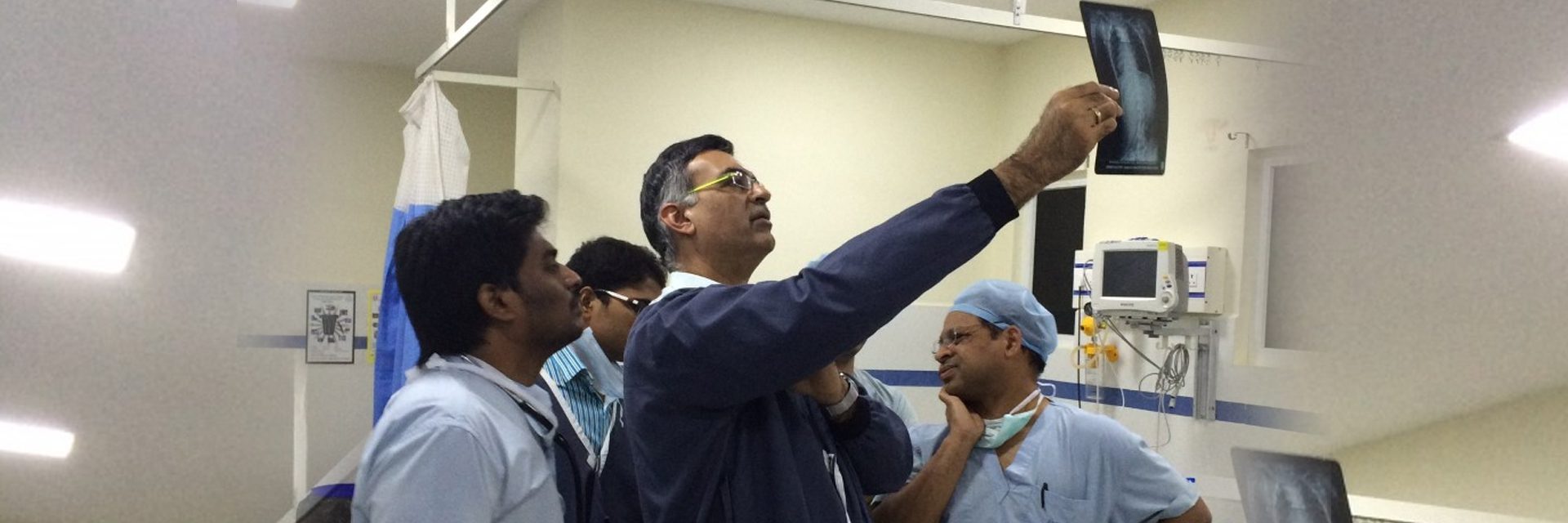(February 17, 2022) He is known for performing the first 10 liver transplants in Andhra Pradesh. This dedicated doctor is also a charitable powerhouse. Giving liver care state-of-the-art facilities across India is an aspiration he is slowly achieving. The enterprising Dr Tom Cherian, with a 30-year career, has 20 exhaustive years as a liver transplantation specialist. With many firsts to his credit, the doctor was also behind the first successful split liver transplant in AP too. Called a “Legend in Surgery” by a national newspaper, Dr Cherian has so far published 84 papers, done 100 international presentations, and has many awards and grants to his name.

Dr Cherian has performed 675 liver transplants in India and the UK.
He continued his parent’s legacy
Founder, MD, South Asian Liver Institute, Hyderabad, the Hippocrates oath is at the heart of his long and brilliant career. The doctor, who was in the UK for 17 years, decided to come back (2014), and serve the country. A decision that was tough to make. UK saw him at the crux of cutting-edge medical advances. Twelve years on basic and specialist surgical work with the all-important liver transplantation specialty at Queen Elizabeth Hospital, King’s College Hospital came next, Europe’s best liver transplant centre.
The happily married surgeon with a stellar career was happy to see his children study in the best London schools. He himself studied at Baldwin Boy’s High School, then Christ College (in Bengaluru).
The boy, who studied at King’s College London later, has always wanted to emulate his father. That responsibility to take forward his cardiac surgeon Padma Bhushan awardee father’s legacy and his pediatrician mother was very important. His parents, who passed away, still guide him on his altruistic initiatives. August shoes to fill, Dr Cherian’s father, Dr Jacob Cherian won the Padma Bhushan for charitable work in Tamil Nadu. “After him, I am the president of the charitable missionary society that serves without making a penny. There are good people who take care of day-to-day functioning of all – an engineering college, a polytechnic, two nursing colleges, an arts college, and two schools, catering to over 6,000 students. There is also a 275-bed hospital,” he informs in an interview with Global Indian.
Leading by example
The magnanimous personality of his father finds life in the doctor’s philosophy. Dr Cherian now nurtures the dream of ushering in the most advanced and cheaper liver care facilities across India. “It is ridiculous that out of 29 states, only seven states can boast of liver transplantation facilities. India has rudimentary liver care systems. In cardiology, we are one of the best but in liver care, we are worst. There is a great need for good quality liver care services. I am hoping to achieve this through the South Asian Liver Institute. If you can have an airport everywhere why not liver transplantation services?” he questions.
“Ever since childhood, I wanted to be a surgeon,” smiles the good doctor, who has performed 675 liver transplants, 400 in the UK and 275 in India. To his credit are also over 250 complex liver cancer resections. His first stint in India was as head of liver transplantation and liver surgeries at Global Hospital, Hyderabad. Two years on, he became national director of liver surgery and transplantation, Care Group.

Highly acclaimed for his work, Dr Cherian was named the ‘Legend in Liver Transplant Surgery’
Liver care for charity
Charitable initiatives are ingrained in him, and this led him to do his first liver transplants at Hyderabad’s prestigious government hospitals – Osmania Medical College, Nizam’s Institute of Medical Science, and GB Pant Hospital for free; serving the lowest strata for five years at a stretch. “At Nizam’s, I slowly trained people, and am now a professor there,” he mentions.
Playing a pivotal role in making liver surgery available to the common man across India, 13 liver clinics were started as specialist liver transplantation facilities were non-existent – at Siliguri, Guwahati, Bhubaneshwar, etc. “Eastern India has very poor liver care facilities,” he observes. Creating a network for appropriate medical guidance, and cost-effective treatment has been his sole objective.
“What worries me is that even when I am using the latest techniques used in hospitals like Kings College London, hundreds and thousands of people are dying as they are unaware of the distinct options of care available,” he explains. Cost-effectiveness is also a huge challenge, something he tackled on a war footing. “I brought down liver transplantation costs from Rs 30 lakh to Rs 21 lakh at the Care Group. At South Asian Liver Institute, we have designed treatment in such a manner that room costs are saved. We do as few hospital admissions as possible, and let patients go back after surgery,” says Dr Cherian.
The institute has been in partnerships with the Wockhardt Group and Manipal Group, who have in turn outsourced liver care services for entire Maharashtra and Andhra Pradesh, respectively. Apart from these, there are associations with other medical chains to help penetrate markets in northern Karnataka and Telangana now.

Dr Cherian with his family
Having a doctor as his wife ensures medical talk is dinner table conversation at the Cherian home. He met his wife, Dr Lekha Cherian, a gastroenterologist in London. The couple has two boys, Ryan and Aiden. The older one is studying biomedical engineering at Oxford.
Away from his surgical scrubs, he has a creative gene too. He loves strumming the guitar. “I enjoy jam sessions with my boys who are good at the piano. I am a semi-professional photographer, and have sold photographs to some UK magazines too,” he concludes.
- Follow Dr Tom Cherian on LinkedIn
Also Read: On the right foot: UK-based Dr Venu’s surgical solutions give diabetics new lease on life


